Our cookies
We use cookies for three reasons: to give you the best experience on PGS, to make sure the PGS ads you see on other sites are relevant , and to measure website usage. Some of these cookies are necessary to help the site work properly and can’t be switched off. Cookies also support us to provide our services for free, and by click on “Accept” below, you are agreeing to our use of cookies .You can manage your preferences now or at any time.

Privacy overview
We use cookies, which are small text files placed on your computer, to allow the site to work for you, improve your user experience, to provide us with information about how our site is used, and to deliver personalised ads which help fund our work and deliver our service to you for free.
The information does not usually directly identify you, but it can give you a more personalised web experience.
You can accept all, or else manage cookies individually. However, blocking some types of cookies may affect your experience of the site and the services we are able to offer.
You can change your cookies preference at any time by visiting our Cookies Notice page. Please remember to clear your browsing data and cookies when you change your cookies preferences. This will remove all cookies previously placed on your browser.
For more detailed information about the cookies we use, or how to clear your browser cookies data see our Cookies Notice
Manage consent preferences
Strictly necessary cookies
These cookies are necessary for the website to function and cannot be switched off in our systems.
They are essential for you to browse the website and use its features.
You can set your browser to block or alert you about these cookies, but some parts of the site will not then work. We can’t identify you from these cookies.
Functional cookies
These help us personalise our sites for you by remembering your preferences and settings. They may be set by us or by third party providers, whose services we have added to our pages. If you do not allow these cookies, then these services may not function properly.
Performance cookies
These cookies allow us to count visits and see where our traffic comes from, so we can measure and improve the performance of our site. They help us to know which pages are popular and see how visitors move around the site. The cookies cannot directly identify any individual users.
If you do not allow these cookies we will not know when you have visited our site and will not be able to improve its performance for you.
Marketing cookies
These cookies may be set through our site by social media services or our advertising partners. Social media cookies enable you to share our content with your friends and networks. They can track your browser across other sites and build up a profile of your interests. If you do not allow these cookies you may not be able to see or use the content sharing tools.
Advertising cookies may be used to build a profile of your interests and show you relevant adverts on other sites. They do not store directly personal information, but work by uniquely identifying your browser and internet device. If you do not allow these cookies, you will still see ads, but they won’t be tailored to your interests.
Law Research MPhil/PhD
King's college london, university of london, different course options.
- Key information
Course Summary
Tuition fees, entry requirements, similar courses at different universities, key information data source : idp connect, qualification type.
PhD/DPhil - Doctor of Philosophy
Subject areas
Law / Legal Studies
Course type
The School’s vision for its research culture is to create a focal point for interdisciplinary, transnational legal research that encourages cross-fertilisation of ideas within existing areas of strength while incorporating a new global perspective. The School is one of a handful of Law Schools around the world pioneering a transnational approach. Our aim is to foster innovative research that yields new insights for global challenges relating to personal responsibility, health, wealth, justice, communication and governance. The Dickson Poon School of Law is home to over 90 doctoral researchers. Their projects cover a broad range of topics from intellectual property to information technology, from competition law to counter-rules, from global justice to gender equality. We offer two research degrees – the Masters of Philosophy in Law (MPhil) and the Doctor of Philosophy in Law (PhD).
Course detail
While graduate research opportunities are organised through The Dickson Poon School of Law, you may well find that your work is related to research undertaken at one of the research centres associated with the School. These centres enjoy strong international and national reputations and contribute to legal and wider public debates on important issues of today. The majority of our research students are full-time; however, we are able to offer study on a part-time basis in exceptional circumstances. To apply for part-time study, please choose the full-time route via the application portal and be prepared to make a case at your interview. Our researchers are an integral part of the King’s community and fully participate in the life of the School. They join our academic staff in the premises in Somerset House east Wing. In addition to a dedicated suite of offices, our doctoral researchers have access to the Maughan Library, British Library of Economics and Political Science and the Institute of Advanced Legal Studies. Our dedicated Information Specialist for Law helps to ensure that each of our researchers has access to the materials they need to complete their projects.
UK fees Course fees for UK students
For this course (per year)
International fees Course fees for EU and international students
A Master's degree with Merit in Law or a related discipline, with strong evidence of research and writing ability. This will normally involve achieving a Merit in a dissertation component of the Master’s degree. We usually also require a Bachelor's degree with 2:1 honours. Candidates who do not meet these criteria will only be admitted if the prospective supervisor makes a case for admission based on the candidate's broader work experience.
LPC, LLM, PgDip Legal Practice Course
Liverpool john moores university, phd postgraduate research opportunities in law, mphil postgraduate research opportunities in law, bar training course llm/pgdip, bristol, university of the west of england, bar training course, manchester metropolitan university.
Browser does not support script.
King's College London - Homepage
- Undergraduate
- Postgraduate
- International Students
- Study abroad
- Professional Education
- Short courses
- International Foundation
- Accommodation
- Visit King's
- Learning & teaching
- Language Centre
- Student Services Online
- Libraries & Collections
- Student news
- Careers & Employability
- Students' Union
- Academic calendar
- King's Sport
- Research at King's
- King's Health Partners
- Arts & Humanities
- Dentistry, Oral & Craniofacial Sciences
- Life Sciences & Medicine
- Natural, Mathematical & Engineering Sciences
- Nursing, Midwifery & Palliative Care
- Psychiatry, Psychology & Neuroscience
- Social Science & Public Policy
- Alumni Community
- Alumni benefits
- Events & reunions
- News & features
- Mission & strategy
- Internationalisation
- Governance & Legal
- Organisational structure
- Work at King's
- Diversity & Inclusion
- Financial information
MPhil/PhD Programmes
There are over 400 research students at the Institute who come from a range of backgrounds including psychology, psychiatry, nursing, social work and basic sciences.
Our MPhil/PhD programme allows students to carry out research in any of our 14 departments and in a wide variety of areas; from molecular genetics and biology, to neuroscience, neuroimaging, clinical research studies, psychological studies and new treatments; from longitudinal studies to clinical trials, bio statistics, epidemiology and health services research and transcultural studies.
Please see their departmental webpages and online prospectus entries to see research options/areas currently being undertaken:
Is a PhD for me?
Our PhD students come from a variety of backgrounds, with a variety of qualifications and experience. Take a look at the following information and recent/current student profiles, to find out whether a PhD is right for you:
King's College London says:
- All candidates should usually possess the normal minimum entry qualifications for registration prescribed in the King’s Core Code of Practice for Postgraduate Research Degrees . This is normally a 2:1 in a relevant field.
- Candidates should possess an adequate level of English competence. Candidates for whom English is not the first language will be required to provide proof that they possess an adequate level of English competence . The minimum level accepted is an IELTS score of 6.5. Grade C or above in GCSE English is also acceptable. Candidates must also satisfy their appointment panel of their competence.
The Institute of Psychiatry, Psychology & Neuroscience (IoPPN) says:
- It is useful to have a Masters degree, or related work experience in your chosen area of interest.
EU and International students should check the list of equivalent grades for international qualifications . Please contact the Health Schools Admissions Centre for further enquiries.
If you wish to study full time:
- You will be expected to submit your thesis within 3 years.
- You are permitted to work part time, but students are expected to work on their PhD for 35 hours a week and we encourage any part time work to be agreed with your supervisors.
If you wish to study part time:
- You will be expected to submit your thesis within 6 years.
- You are allowed to submit your thesis early (as early as 4 years) but this must be agreed with your supervisors and other conditions apply. Please contact the Postgraduate Research Team for more information.
The current fees for the 2022/2023 academic year are:
- Full time Home = £7,050 per year
- Full time Overseas = £26,640 per year
- Part time Home = £3,525 per year
- Part time Overseas = £13,320 per year
If you are a member of staff at the IoPPN you may be eligible for a discount on fees. Please contact the Postgraduate Research Team for more information.
Please note that tuition fees are subject to an annual increase of up to 5%. For more information, see the Fees webpage.
Students can start in either October (when most students start), February or June.
Students who are being funded by an external source should check whether there are any limitations on start dates.
If you are not able to self fund your PhD studies, then you will need to find funding from another source.
The IoPPN offers a number of full time studentships on an annual basis, funded by the Institute itself, and partly by the Medical Research Council. These studentships offer students full payment of tuition fees for 3 years and a monthly tax free stipend for living. These studentships are for set projects.
Individual academics and departments also offer full time fully funded studentships, on an ad hoc basis, if they receive funding themselves. These are also usually for set projects.
All funded studentships are advertised on our Studentships webpage.
If you have your own project in mind and would like to find funding, browse these links:
- Centre for Doctoral Studies Funding Database
- Research & Development Office
- Research grants office
- Medical Research Council
- Economic and Social Research Council
- British Council
- Government Loans
For more information on funding at Kings, please see the Funding webpage.
Student Profiles

Students take classes together in their first year and all have offices on the same floor, which makes it a very social and friendly place to study. It also means that students researching different areas of psychiatry, psychology, neuroimaging, and genetics are in constant contact, which helps to broaden your exposure to research.
Students and staff alike are always keen to get involved in collaborative projects, whether small or large, allowing students to explore areas of interest outside those strictly relevant to their PhD.
The PhD itself is usually very independent, driven by the student's own ideas and interests. These collaborations often also extend beyond the Centre, allowing for research and conference opportunities abroad.
All in all, it's a great place to be!

I wanted to understand how pioneering brain imaging could lead to new ways for diagnosing the condition, and as a result, I applied for a PhD with Dr Andy Simmons at the Department of Neuroimaging.
As a PhD student, the Institute has provided outstanding research facilities for postgraduate education and the provision of college organised training courses for personal development and teaching has been fantastic.
I have enjoyed this experience so far, and benefited from excellent supervision in a friendly and stimulating research environment.

The IoPPN has great research facilities and I'm really pleased that I have had the chance to study here.
With Psychosis Studies being one of the larger departments at the IoPPN, I've found there are always lots of opportunities to attend relevant talks and seminars, including weekly Psychosis Studies meetings with internal and external speakers.
I am really enjoying being a student here and one of the best things is that you can create your own opportunities. I set up a problem-based learning group to help students gain a greater understanding of magnetic resonance imaging, including the physics and basic analysis. They have been really well attended and the group has grown considerably since it was first stated. I have also had the opportunity to be the student representative for Psychosis Studies and be a mentor to some MSc students too.
When I graduate, I would like to continue working in research as a post doc, working my way up the academic ladder to professor.
The Next Steps
- The Application Process
- Funded PhDs
- Contact the Postgraduate Research Team
- Covid-19 study update
- LISS CASE funded PhD studentship
- Our research
- Our connections
- Diversity & inclusion

© 2024 King's College London | Strand | London WC2R 2LS | England | United Kingdom | Tel +44 (0)20 7836 5454
Law, The Dickson Poon School of Law
- King's College London
- 1 - 50 out of 228 results
- Last Name (descending)
Search results

Person: Doctor of Philosophy

Demah Albassam

Reef Alfahad

Huda Alwahaiby
Person: Master of Philosophy

Tanya Aplin
- Laws - Professor of Intellectual Property Law
Person: Academic

Sham Arun-Qayyum
- Laws - Lecturer in Property and Trusts Law (Education)

Darya Bahram
- Laws - Research Associate
Person: Research

David Bailey
- Laws - Visiting lecturer
Person: Visiting Staff

- Laws - Senior Lecturer in Professional Legal Education

Patrick Balsano

Emily Barritt
- Laws - Senior Lecturer in Environmental Law

Martin Bengtzen
- Laws - Lecturer in Corporate and Commercial Law (Online Programmes)

- Laws - Senior Lecturer in Professional Legal Practice Education

Andrea Biondi
- Laws - Professor of European Union Law

Robert Blackburn, KC
- Laws - Professor of Constitutional Law

Surasak Boonyanukoolkit

Phoebe Bower

Benjamin Bowling
- Laws - Professor of Criminology & Criminal Justice

Megan Bowman
- Laws - Professor of Climate Law

Philip Bremner
- Laws - Lecturer

Roger Brownsword
- Laws - Professor of Law

Michael Butler
- Laws - Senior Lecturer in Professional Legal Education (Education)

Hannah Camplin
- Laws - Senior Lecturer

Paul James Cardwell

Gabriele Carovano

Alina Carrozzini

Giulia Cavaliere
- Laws - Lecturer in Medical Law

Sevim Celebi

Adrian Chan

Shouyu Chong
- Centre of Construction Law

Charles Clarke

Kevin Coates

Davina Cooper
- Laws - Research Professor in Law

Antonio Correa Ferrer

Mary Cotrufo

Jillian Craigie

Leigha Crout

Sonia Cruz Davila

Emma Cullen

Stephen Daly
- Laws - Senior Lecturer in Corporate Law

Daniel D'Ambrosio

Sophia De Arez Cintra

Catherne De Contreras

Ali Dehdashti
Sylvie Delacroix
- Laws - Jeff Price Chair in Digital Law


Caio De Oliveira

Sunny Dhillon
Online, part-time International Financial & Commercial Law LLM
Expand your understanding of the law and the legal frameworks impacting global finance, trade, and commerce. Study with world-leading academics in one of the oldest, most respected law schools in the UK.
Key information
Course overview.
This LLM aims to equip you with detailed knowledge and understanding of a range of areas within financial and commercial law.
It’ll prepare you for senior careers in a fast-changing global context. You’ll study the legal concepts, values, principles, and rules which underpin English, European, international, and transnational law in this area. Your familiarity with different legal frameworks and how they apply across jurisdictions gives you a competitive advantage in your career.
Informed by our own world-leading research, at the forefront of practice, you’ll also explore current problems and challenges facing financial institutions and commercial entities.
Webinars and online forums provide opportunities to discuss examples from your own jurisdictions and workplaces with a wide range of experienced legal professionals studying the course.
Why choose this online LLM?
World-class education.
The Dickson Poon School of Law is recognised globally as one of the best law schools in the world. You'll develop cutting-edge legal expertise from from leading experts.
Part-time, flexible learning
You’ll get the same education quality and qualification as on-campus but with added flexibility and support. Attend live webinars or watch again via the recording.
Global online community
Grow your global network and gain fresh insight. Learn alongside professionals from different backgrounds and cultures.
Career progression
Study and enhance your education without interrupting your career. This LLM will develop your qualifications and skillsets while actively contributing to your professional role.
What you'll study
Course content is structured to provide you with an in-depth understanding of key areas of financial and commercial law. You’ll develop advanced knowledge of the approaches to governance of financial activities, sales, finance, shipping, energy and investment related transactions, dispute resolution and conflicts of law.
Your studies are underpinned by UK law, several other major domestic legal systems, and by the international and transnational commercial law instruments.
Watch our course overview video to find out more
View video transcript here .
Module overview
This online International Financial & Commercial Law LLM is comprised of 12 core 15-credit modules (180 credits in total). All core modules on the course are compulsory and you must pass all these modules to complete the award. Please note modules are reviewed regularly and are subject to change.
You’re required to take the following 12 core modules:
International Commercial Arbitration
This module focuses on the main steps of arbitral proceedings, from the drawing of the arbitration agreement to the enforcement of the arbitral award. You’ll get an overview of international commercial arbitration in both theory and practice. It provides a brief history of international commercial arbitration and examines the diversity of the legal systems that may apply during proceedings, either procedurally or substantively. You’ll learn to assess legal issues and the problems that may arise from international commercial arbitration. You’ll also understand how to propose and present recommendations to deal with them.
Financing of International Trade
International trade is inherently risky. Sellers (exporters) run the risk of buyers failing to pay for goods, so they prefer payment upfront; buyers (importers) run the risk of not receiving the goods for which they paid, so they prefer to pay after receipt. Since medieval times and the Lex Mercatoria, innovative approaches have been developed to protect the financing of international trade. In this module, you’ll study different approaches, including the use of collections, documentary credits, and demand guarantees. You’ll consider the financial intermediaries and third-party principals or sureties who facilitate trade transactions. You’ll also examine the legal and practical implications of these key instruments and relationships.
Corporate Finance
This module introduces you to the principles of finance theory, and their practical implications in the context of equity and debt finance and secured lending. The focus is on equity and debt securities (shares, bonds, notes, hybrid instruments) and modern funding techniques (term loans, lines of credit, syndicated loans). You’ll also examine the mechanisms for securing repayment (security interests, quasi-security).
Fundamentals of Mergers and Acquisitions
This module explores the purpose and function of mergers and acquisitions and the role that the legal framework plays in facilitating or restricting takeover activity. The focus of the module is on the regulation of public takeovers in the UK, but you’ll also study comparative elements of the EU and US regulatory frameworks. The module contains several case studies of recent transactions that allow us to discuss controversial elements of law and policy in context.
Transnational Corporate Restructuring
This module introduces you to the theory and practice of modern debt restructuring techniques. Firmly grounded in bankruptcy theory, it analyses relevant legal issues through the lens of a combination of a ‘commons/anti-commons’ approach and ‘contractualisation of bankruptcy’ models. It includes purely contractual arrangements, such as intercreditor agreements, security enforcement and release provisions. You’ll also look at statutory mechanisms, including (pre-pack) administrations, schemes of arrangement and company voluntary arrangement.
International Financial Regulation
This module considers the objectives of transnational financial regulation, the governance structures, and legal problems facing financial markets and financial institutions. It examines forms of economic and financial integration, and rules governing selected aspects of regulation, including banking, credit rating agencies, insider dealing, and market manipulation. You’ll study the principal features of the law of Economic and Monetary Union and Banking Union of the European Union.
Financial Risk and Regulation
This module aims to introduce the principles of international banking regulation and supervision. The focus is on the risks that banks are exposed to in their day-to-day operations and in their interaction with other intermediaries within financial markets and within payment and clearing systems. The module also explores the ways banks, regulators and supervisors manage and mitigate these risks.
Financial Products
This module aims to introduce the students to modern financial products in the retail and wholesale markets. The focus is on modern funding techniques (syndicated loans, term loans, lines of credit); debt securities (bonds, notes, commercial paper, hybrid instruments); techniques for securing repayment (security interests and title-based financing) and complex financing structures (securitisation, collateralised debt obligations and the hedging of exposures through derivatives, as well as repo financing).
Capital Markets
Delve into the operation and functioning of modern capital and financial markets in bonds, equities, and derivatives. This covers both the technical and legal side of the way different financial instruments are now issued, held, and traded. You will consider the provision of custodial services, the clearing and settlement of these instruments and the modern legal frameworks and regulatory principles that apply, including the impact of CSR and ESG frameworks on capital markets transactions. Of particular significance are innovative financial products, trading techniques and their regulation.
Private Equity
A typical private equity transaction involves the acquisition of a business by borrowing money from a third party which is to be repaid with the business' own cash flows. Until repayment is complete, the business' assets secure the outstanding debt. With the number of private equity transactions on the rise, this module analyses the economic rationale and legal nature of these transactions. It addresses the policy concerns in terms of disclosure and transparency, as well as minority shareholder and employee protection.
Transnational Business Instruments
The aim of this module is to highlight and reflect on the variety of ‘types’ of legal instruments regulating transnational business. Specifically, we’ll explore the legal documents which are not sanctioned as national or international law yet exercise a national or global sway. These range from codes of conduct about corporate responsibility to so-called 'informal international law’ on trade. They also encompass transnational human rights requirements for businesses, drafted by one person to private dispute resolution mechanisms for Internet disputes and other areas of transnational business. We’ll discuss and debate the practical, sometimes ethical impact these instruments can have on businesses.
Project Finance
While the business of project finance is far-reaching and involves financing an offshore wind farm in the North Sea one year and a mining project in Central Asia the next, the fundamentals always remain the same. Since these fundamentals permeate the legal considerations and the actual work of drafting documentation, a lawyer working in this field must have a good understanding of how the fundamental concepts of project finance translate in terms of legal documentation. Our objective is that at the end of this course, students will have a grasp of the principles of project finance and how these form the structural background of the legal documentation.
Module assessments
A small percentage of the final module mark is based on a forum and the remaining percentage on a take-home exam in the form of an essay. Assessment methods are subject to change for the upcoming academic year.
Meet the leadership and academic team
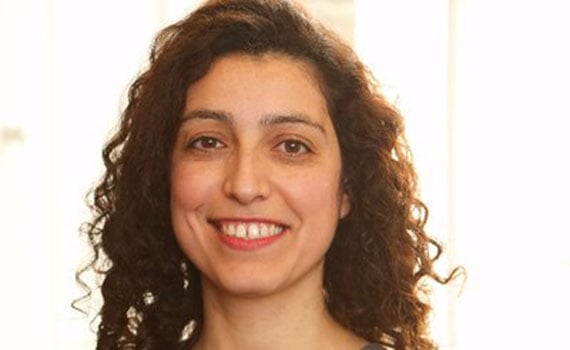
Dr. Anat Keller
Director of Online Programmes
Dr Keller is a qualified solicitor of England and Wales and holds a PhD from the Centre for Commercial Law Studies at Queen Mary University of London, an LLM from the London School of Economics and double first-class bachelor’s degrees in management and law (magna cum laude).

Dr. Soterios Loizou
Programme Director
Dr. Soterios Loizou, Senior Lecturer at The Dickson Poon School of Law since 2006, holds prestigious fellowships and degrees, including a PhD from the University of Cambridge and Harvard Law School. His research in commercial law and international arbitration has won him top honors such as the Colin B. Picker Prize.

Entry requirements
Standard requirements.
A 2:1 (Hons) or above (or international equivalent) in a Law degree or joint Law degree, or 60% or above in an LLM or Graduate Diploma in Law (or international equivalent).
Non-standard entry requirements
Please note that if you have a lower degree classification, or a degree in an unrelated subject, your application may still be considered if the following criteria can be met (all applications are considered on a case-by-case basis):
- A high 2:2 (57%) in a single or joint degree in Law or international equivalent and at least three years’ professional legal experience.
- A 2:1 in a non-Law honours degree or international equivalent and at least three years’ professional legal experience.
- A previous master’s degree (or above) in a non-Law subject area or equivalent and at least three years’ professional legal experience.
Candidates who fail to meet the criteria above are unlikely to be successful.
English language requirements
English language band: B
To study at King's, it is essential that you can communicate in English effectively in an academic environment. You’re usually required to provide certification of your competence in English before starting your studies.
Nationals of majority English speaking countries ( as defined by the UKVI ) who have permanently resided in this country are not usually required to complete an additional English language test. This is also the case for applicants who have successfully completed:
- An undergraduate degree (at least three years duration) within five years of the course start date.
- A postgraduate taught degree (at least one year) within five years of the course start date.
- A PhD in a majority English-speaking country (as defined by the UKVI) within five years of the course start date.
For information on our English language requirements and whether you need to complete an English language test, please see our English Language requirements page .
Personal statement and supporting information
You'll need to submit a personal statement, CV and two reference letters as part of your application.
Your personal statement should address the following two questions:
- Why are you applying for this specific programme and how does it fit in with your future plans?
- How does your experience and education make you a suitable candidate for the programme?
You’ll also need to submit a copy (or copies) of your official academic transcript(s), showing the subjects studied and marks obtained. If you have already completed your degree, copies of your official degree certificate will also be required. Applicants with academic documents issued in a language other than English, will need to submit both the original and official translation of their documents.
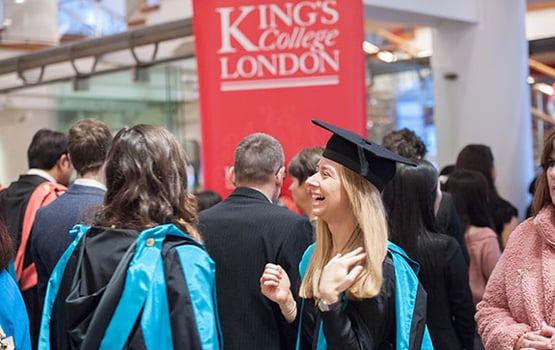
Not sure if you meet the requirements, or if the course is right for you? Speak to our team to get tailored support:
Career options in Financial and Commercial Law
This programme will enhance your career options by allowing you to specialise in the highly sought-after areas of financial and commercial law. You could work as a lawyer or consultant to international organisations across the public, private and not-for-profit sector. It’s also an excellent foundation for students who are considering pursuing legal research.
Attracting a diverse and appealing cohort, a big advantage of the course is the chance to grow your global network. You’ll be studying with legal professionals at various stages of their career from every corner of the globe. From top lawyers, senior partners, and judges to rising stars and new graduates, some of our students bring decades of experience to discussions, enriching your learning.
The Dickson Poon School of Law has strong connections with some of the world’s leading legal firms and international employers. You’ll join a legacy of graduates that are sought out by some of the leading employers in the field.
Ready to join us in 2024?
Discover more.
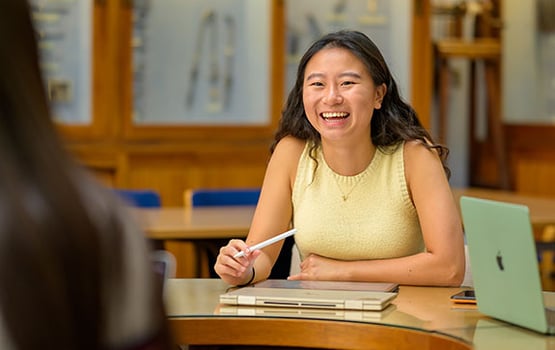
Discover full tuition fees for our online courses.
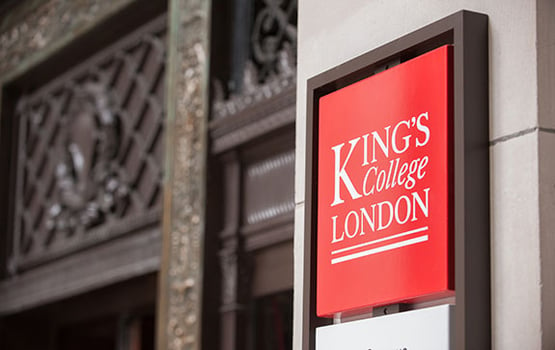
Funding options
Find out more about our range of funding options and payment plans.

See answers to common questions about studying online with King's.
Video transcript - Course overview
In the International Financial and Commercial LLM programs, we provide students with in-depth understanding and enhance their expertise in various areas in financial and commercial law. The objective is for students to develop skills and analytical tools to enable them to analyze, think critically about and apply the law. The International Financial and Commercial LLM program are taught 100% online.
There are lots of advantages to studying online, the first being that it does offer a degree of flexibility. The majority of our students are working professionals and this is something that we fully expect from our students studying on the online LLM.
The International Financial and Commercial LLM program aims to connect finance with law.
Every module will start and run for a period of eight weeks. Students will take one online webinar a week. There are two assessments that they will take towards the end of their teaching period, and then they will receive their results at the start of the next teaching period.
We have designed modules that look at at global trading, at the free flow of capital and investment, new products, new technologies, and legal innovation that needs to capture financial innovation. The topics explored range from the financial products available on the markets to the normative framework of financing and dispute resolution proceedings for financial law disputes.
The advice I would give to prospective online students is that the online LLM is exactly that. It's online, but it is a full robust LLM as well.
We ultimately take a truly global perspective as the programs and the various modules are designed in a way that it would be useful to students regardless of their respective jurisdiction and legal and educational background. The graduates have acquired a strong theoretical foundation in law and gained invaluable insight into best practice in the field. As a result, they can be found in top law firms.
You have the potential. We’ll help you unleash it. Take charge of your future today.
Questions about our courses, studying online or the application process? Our expert Enrolment Advisors are on-hand to help. Simply fill in the form below, and they’ll get in touch with you shortly.
Fields with a '*' are mandatory.

Joint PhD Programme with King's College London
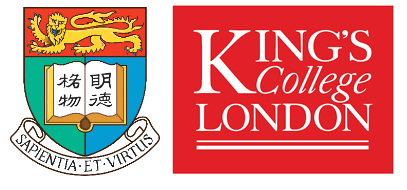
Background of King’s College London
King’s College London was founded in 1829 and is one of the top 10 universities in the United Kingdom according to latest QS World University Rankings. It has nine academic schools of Arts & Humanities, Biomedical Sciences, Dental Institute, Institute of Psychiatry, Law, Medicine, Natural & Mathematical Sciences, Nursing & Midwifery and Social Science & Public Policy. Its academic excellence enables world class teaching, research and innovation in the service of society. The Joint PhD programme was introduced in 2010/11. It offers a valuable opportunity for students to pursue research in a wide range of disciplines as well as in topics that invite interdisciplinary and cross-cultural approaches at two premier universities in Asia and Europe.
Programme Features
Students admitted to the joint PhD programmes will:
- be registered as full-time students at both universities and be able to enjoy their full range of academic and various facilities;
- be guided in their work by faculty members from both universities, and be examined to the standards of both; and
- normally split their time of study equally between the two universities and spend the last 6 months of study in the home university.
- Interested applicants should first contact the Faculty concerned on available supervisors and subject areas
- King's College London postgraduate entry requirements and English Language proficiency requirements
- The University of Hong Kong research postgraduate entry requirements and English Language proficiency requirements
- To apply through the University of Hong Kong (i.e. HKU as your home institution)
- To apply through the King's College London (i.e. KCL as your home institution)
Fees and Scholarships
Joint PhD candidates will pay tuition fees to the admitting university for the whole period of candidature. Applicants applying through the University of Hong Kong can apply for Postgraduate Scholarships . Candidates who have outstanding academic performance or proven research records may apply for the HKU Presidential PhD Scholarship and Hong Kong PhD Fellowship Scheme . Students who pursue a joint PhD degree with King’s in Integrative Medicine may apply for the HKU Postgraduate Fellowships in Integrative Medicine . The Fellowships, offered by the LKS Faculty of Medicine, give preference to students enrolled in the HKU-King's College London Joint PhD programme with HKU being the home institution. For enquiries about the Fellowships, please contact the Li Ka Shing Faculty of Medicine directly.
Award of Degree
Upon successful completion of the programme, a student will be conferred a PhD degree jointly awarded by the University of Hong Kong and the King’s College London.

UCL Faculty of Laws
- Fees and scholarships

A PhD at UCL Laws will allow you to pursue original research and make a distinct and significant contribution to your field
Skip to: A community of scholars | Research culture | Academic development | Networking and social events | Facilities and resources | Recent successes of PhD students | Recently completed PhDs
YouTube Widget Placeholder https://www.youtube.com/watch?v=e_wrD7py4Xg
We are committed to the quality and relevance of the research supervision we offer and as an MPhil/PhD candidate, you will work with academics at the cutting edge of legal scholarship.
Furthermore as a research student, you will be an integral part of our collaborative and thriving research community. Student-run ‘work in progress’ forums and an end-of-first-year PhD workshop will give you the opportunity to present and discuss your research with peers and academic colleagues.
Tailored skills seminars will provide you with a supportive research environment and the critical skills necessary to undertake your research. To foster your academic development we also offer additional faculty funds, which can assist you with the costs of conferences and other research activities.
A community of scholars
UCL Laws is a world-leading community of intellectually dynamic scholars responding to today’s challenges. As a Laws MPhil/PhD student, you will have the opportunity to learn from, and contribute to, this research culture.
The UCL Laws Faculty is rated the top law school for research quality in the UK ( REF 2021 ).
The UCL Laws PhD programme has approximately 60-70 outstanding research students at any one time. The programme accepts applicants with external funding, and puts forward its most outstanding applicants for UCL scholarships.
Research culture
UCL Laws was ranked first in the UK for its world-leading research environment in the most recent Research Excellence Framework and our commitment to our research culture is mirrored in our postgraduate research environment. As a research student here you can take advantage of a range of opportunities to make the most of your studies, and get the best start in your career.
A vibrant and brilliant student community
“UCL Laws truly is an amazing place and I am glad that it is where I have decided to undertake my doctoral studies. At UCL, I have been encouraged to pursue innovative and original research that might not have been possible in other places.
"The PhD student community is vibrant and made up of utterly brilliant fellows from around the globe. I gained a lot simply by spending time with these people in seminars, in the common room and at the pub. All in all, UCL Laws is a top-rate institution to pursue graduate studies.”
Jean-Frédéric Ménard, UCL Laws PhD candidate
From opportunities to teach, develop your skills, and present your work, to networking and social events, alongside dedicated research student support facilities, you can find the resources to help you make a distinct and significant contribution to your field.
Academic development
We nurture the development of your research skills from the very beginning of the programme with our skills seminar series. Providing initial support and information about the research process, these seminars will advance your critical skills in research methods and theory as well as fostering your legal and academic career skills.
Our skills seminars culminate in our First-Year Research Presentation Workshop. Here you will have the chance to present your work in front of peers and academic colleagues, gaining both valuable feedback and experience of presenting academic papers in a friendly and supportive environment.
“[The research presentation workshop] gave all new PhD candidates the chance to reflect on their work and to present it, for some of us for the first time, to colleagues and faculty members. It was great to see so many supervisors attend – they provided constructive feedback and words of encouragement. This workshop has given us valuable insights into effective academic presentation skills and helped anticipating what presenting at conferences will be like in the years to come.”
Christina Lienen, PhD Candidate
The Work in Progress Forum is a seminar series led by current PGR students, and is an excellent opportunity to present and discuss your research in a supportive environment. All students are encouraged to be involved, and you may have the chance to convene the forums during your PhD.
“The PhD Work in Progress Forum is an integral part of the experience as a research student at UCL Laws. It provides opportunities for students to discuss their work with peers and to hone their skills as discussants in a rigorous yet supportive environment. Convening the Work in Progress Forum offers the chance to learn how to organise academic events. Last, but certainly not least, the Forum shapes the academic community of PhD students that is so vital to successful research.”
Lea Raible, former PhD student
The UCL Journal of Law and Jurisprudence is edited and published by graduate (LLM and PhD) students at UCL Laws. Featuring scholarly contributions from academics, researchers and practitioners, it also showcases outstanding research by post-graduate students at UCL. As a research student here you will have the unique opportunity to contribute to the journal, both editorially and through submitting research for publication.
Where possible, we offer research students the opportunity to provide tutorial teaching on the LLB and LLM. UCL offers training in teaching skills through its UCL Arena One programme.
“The opportunity to become a teaching fellow at UCL while completing your research comes with several benefits. When teaching I am part of the academic community in two ways: as a teacher and as a student. I have been able to learn constantly from both sides and the skills I have acquired have shaped me both personally and professionally. This experience is integral to the preparation of any career, whether it be in scholarship, teaching or something completely outside of academia.”
Sara Razai, Teaching Fellow
Research students can take part in our mentoring programme designed to assist LLM students with their dissertations. Each mentor is assigned a list of students, and will offer encouragement and advice on the form and style of dissertations, as well as provide feedback on draft work at face-to-face meetings and by email.
We recognise that conferences are crucial for you to meet other scholars, gain feedback on your research and ideas, and to engage in the academic world. Because of this, we encourage students to participate in both national and international conferences and to present their work in front of varies audiences, both within and outside of UCL. We also encourage students to organise their own conferences, workshops and reading groups where appropriate. To support conference attendance the faculty provides each research student with a generous Personal Research Allowance, with the opportunity to apply for additional funding too (see below).
The Laws faculty has an active public events calendar, and as part of Legal London we attract the leading figures in the field to contribute to our vibrant programme of events, informing public debate around social, legal, environmental and economic issues. Through this you will have the opportunity to hear cutting edge research and be part of a dynamic research community.
For upcoming events, see our events page .
The Doctoral Skills Development Programme is open to all graduate research students at UCL. The purpose of the programme is to give you the opportunity to expand your generic research skills and personal transferable skills. These skills are intended to help your research at UCL and also to enhance your life skills and employability. To find out more, see the website here .
The UCL Law Journal Blog is the online platform of the UCL Journal of Law and Jurisprudence – UCLJLJ.
Much like our sibling UCLJLJ, the UCL Law Journal Blog is edited and published by graduate (Masters and PhD) students of UCL Laws. The Blog publishes scholarly contributions from academics, researchers and practitioners, as well as showcasing outstanding research of post-graduate students at UCL.
We accepts submissions and contributions in all areas of law and jurisprudence, reflecting the diverse and innovative areas of research at UCL Laws and UCLJLJ.
The Blog’s primary aim is to make a high-quality contribution to current debates on local and global issues of law and jurisprudence, and offer these contributions in a free, accessible, and updated platform, covering up-to-date events, developments, debates, cases, and more.
Finally, the Blog, much like the Journal, seeks to add to the content, research, an contributions of UCL, one of world’s leading law schools.
- View the latest blog
- Follow us on Twitter @ucljlj
Guidelines for Submission
The UCLJLJ Blog editorial board welcomes any contribution that concern the law and legal developments. We welcome reports on proceedings, case notes, book reviews, articles, interviews, and more.
We do not have any preference as to the methodology, and theoretical, doctrinal, interdisciplinary, empirical, and any other methodology – is welcome. Similarly we have no limitation, nor preference, to a particular field of law or jurisdiction nevertheless, in some cases certain contribution may be edited or coupled so to form a theme.
Not only contributions advocating a certain position are encouraged, but also comprehensive critical analyses, replies and reviews. Moreover, active debate is welcome on the blog, ensuring the possibility of all parties to be heard and a common symbolic space of dialogue to be established.
For further information on our blog guidelines, see our blog guidelines page .
Current editors-in-chief
- Leon Vincent Chan
My favourite things about studying at UCL Laws
"There are three things I particularly enjoy about studying at UCL Laws. The first is the rest of the PhD community. The small size of the PhD cohort and the range of interesting topics being worked on helps foster a vibrant and supportive research environment where everyone learns from each other. The second is being situated in Bentham House. Having excellent research facilities and dedicated study space in the heart of London is invaluable, especially as it allows me to attend talks and conferences throughout the city. The third is the opportunity to engage more widely with the work being undertaken by the UCL Law Faculty and UCL as a whole. The opportunity, for example, to attend and contribute to staff work-in-progress seminars and attend discussions in other faculties gives me a cross-disciplinary insight and makes my work more holistic."
Jeevan Hariharan, UCL Laws PhD candidate
Additional funding
Graduate research students at UCL Laws have an annual research allowance that can be used to cover research-related expenses such as purchasing books, attending conferences or any other materials relevant to their research.
The allowance is currently £750 full-time or £375 part-time per financial year.
UCL Laws also runs a by-application research fund for current PhD students, aimed at providing financial assistance to fund valuable research activities that would otherwise be impossible.
Some examples of research activities supported by the fund include:
- Training in new research skills not available through the UCL Skills Development programme or the UCL Doctoral School
- Specialised research equipment or materials
- Support for access to specialised research facilities
- Research trips or visiting studentship
- Attending a conference to present a paper relevant to their thesis
- Organising workshops, seminars or conferences relevant to the thesis
- Activities that will spread knowledge, understanding of and engagement with research with external, non-academic audiences
The PRIF Fund is available to all enrolled MPhil and PhD students at UCL Laws, and is run through the Laws PhD Programme Office.
Networking and social events
We offer a number of events and opportunities for graduate research students to network and socialise with fellow students and academics, to help you make new connections, develop your research and gain new skills.
Each year we host a welcome lunch where first year PhD students meet their supervisors, other PhD students and the members of the PhD team.
Each year, new and returning graduate research students are invited to a special welcome event, hosted by the Dean of the faculty at the start of Term 1. This event provides a wonderful opportunity for new students to meet academic staff and other students from across the faculty.
The UCL Laws PhD Programme is based in Bentham House in Endsleigh Gardens.
In addition, all UCL Laws graduate research students can access the specialist resources provided by the UCL Doctoral School , including useful information about research policies and procedures, societies, events and competitions, as well as to student facilities at UCL.
Some of the best libraries in the world are on our doorstep, and our students are able to take advantage of the specialist collections and materials as part of their studies and research.
UCL Laws students are able to access the UCL Library , which currently holds over 1.3 million volumes, and includes a extensive law collection, which is particularly strong in the fields of international law, English law, public law, jurisprudence and Roman law.
As a member of the University of London , all UCL students can join the Senate House Library and, with permission, visit the specialist libraries of other members of the University of London, including the SOAS Library , the British Library of Political and Economic Science at the LSE, the Institute of Historical Research .
Our students can also make use of the major research library of the Institute of Advanced Legal Studies (IALS) in Russell Square. The collections of the IALS concentrate primarily on common law, civil law and Roman-Dutch law systems throughout the world and include material in western European languages for all jurisdictions for comparative and general reference purposes.
Research students can also register for a Reader’s Pass for the British Library , and make use of its unrivalled reference collection.
Recent successes of PhD students
Four PhD students from the UCL Faculty of Laws have been successful in achieving academic positions in the UK and overseas. You can also read more student news to find out about the events and publications our PhD students have been involved in.
Recently completed PhDs
UCL Laws has a vibrant community of outstanding research students. You can read more about research by students who have recently completed their studies at UCL Laws below.
- Dr Lulwa Althenayan, Between Shari'ah and International Standards: Protecting the Rights of the Child under Saudi Arabia's Human Rights Law
- Dr Chiara Armeni, Public Participation in Decision-making on Wind Energy Infrastructure: Rethinking the Legal Approach Beyond Public Acceptance
- Dr Joe Atkinson, Labour law and human rights: legal and philosophical perspectives
- Dr Caspar Bartscherer, Primary and Secondary Rights in Private Law
- Dr Alexander Green, A Moral Explanation of Emerging Statehood: Political Community and International Law
- Dr Eleanore Hickman, Diversity, merit and power in the c-suite of the FTSE100
- Dr Ashleigh Keall, Conceptions of Harm in the Canadian Constitutional Adjudication of Religious Freedom
- Dr Eva Christina Lienen, The Nuanced Constitution: An Essay on Common Law Constitutional Rights
- Dr Alfonso Salvatore Nocilla, Corporate Rescue at the Crossroads
- Dr Gaiane Nuridzhanian, Ne bis in idem in the Rome Statute of the International Criminal Court
- Dr Ira Ryk-Lakhman, The Protection of Foreign Investments in Armed Conflicts
- Dr Eugenio Enrique Velasco Ibarra Arguelles, Adjudicating the right to freedom of religion or belief in the liberal state
- Dr Dorothy Acha Morfaw Epse Ghogomu, The complexities and inequalities of the laws of divorce in Cameroon and how these can be overcome
- Dr Alberto Coddou Mc Manus, A transformative approach to anti-discrimination law in Latin America
- Dr Kumaravadivel Guruparan, Internal Self-Determination in Public International Law
- Dr Murilo Lubambo De Melo, Entry of foreign investments: convergence of international trade and investment law?
- Dr June Namgoong, Reconstructing trade and labour linkages: A legal analysis of labour provisions in United States trade arrangements
- Dr Igor Nikolic, Licensing standard essential patents: FRAND and the internet of things
- Dr Christopher O’Meara, Necessity and proportionality and the right of self-defence in international law
- Dr Sara Razai, The role and significance of judges in the Arab Middle East: An interdisciplinary and empirical study
- Dr Daniel Seah, The ASEAN character of non-intervention: a study of the relationship between general and regional international law
- Dr Nicholas Tiverios, Relief against contractual penalties in England and Australia: history, theory and practice
- Dr Yael Levy Ariel, Judicial diversity in Israel: an empirical study of judges, lawyers and law students
- Dr Michael Connolly, Easy cases making bad law: the English judiciary, discrimination law, and the statutory interpretation
- Dr Amber Darr, Parallel pasts, divergent destinies: a comparative analysis of transferring and implementing competition laws in India and Pakistan
- Dr Olivia Hamlyn, Beyond Rhetoric: Closing the Gap between Policy and Practice in the EU's Regulation of Risky Technologies
- Dr Guillermo Jimenez Salas, Nonjudicial administrative justice in Latin America. A case study of the Chilean Comptroller-General
- Dr Gerard Kelly, Governing the EU ETS: the contribution and modalities of linkage
- Dr Kimberly Liu, The constitutionality of facially neutral affirmative action in the United States
- Dr Lea Raible, Human rights unbound: a theory of extraterritorial human rights obligations with special reference to the International Covenant on Economic, Social and Cultural Rights
- Dr Diana Richards, Learning to Judge: An Empirical Study of Judicial Attitudes to Training and Sentencing in Romania
- Dr Christopher Riley, Jeremy Bentham and the utility of history
- Dr Anna Tzanaki, The regulation of minority shareholdings and other structural links between competing undertakings: A law & economics analysis
- Dr Yu Shan Chang, The mechanisms and rationale for integrated publicly-funded legal services: a comparative study of England and Wales, Australia and Taiwan
- Dr Anna Donovan, Reconceptualising Corporate Compliance
- Dr Jessica Duggan-Larkin, Human Rights Duties and the International Actions of States
- Dr Eleni Frantziou, The Horizontal Effect of the EU Charter of Fundamental Rights: a Constitutional Analysis
- Dr Mariko Fukasaka, The Adversary System of the International Court of Justice: An Analytical Study
- Dr Andrew Gilbert, British conservatism and the legal regulation of intimate adult relationships, 1983-2013
- Dr Miguel-Jose Lopez-Lorenzo, Truth and knowledge in law: the integration challenge
- Dr Manuela Melandri, Self-determination and state-building in international law: a right in abeyance?
- Dr Andres Palacios Lleras, Competition law in Latin America: markets, politics, expertise
- Dr Azza Raslan, The diffusion of competition law in Africa: theoretical perspectives on the policy transfer process
- Dr Inga Thiemann, She is not just a victim. An intersectional feminist labour law approach to human trafficking into the sex industry
- Dr Larissa Verra Boratti, Environmental assessment from an environmental justice perspective: analysing the impacts of major urban projects in Brazil
- Dr Xiaobo Zhai, Bentham's Theory of the Nature of Law
- Dr Ghislaine Lanteigne, The Best Interests of the Child in Relocation Disputes: England and Wales, and Canada
- Dr Claire Lougarre, The Right to Health: Legal Content through Supranational Monitoring
- Dr Vassiliki Martzoukou, Claims to Resources and Positive Obligations under the European Convention on Human Rights
- Dr Natalie Ohana, Social Exclusion through Legal Naming Events: The Case Study of Violence against Women by Male Partners
- Dr Luke Price, Improving the legal regulation of organisations by re-assessing the requirements of responsibility in the corporate context
- Dr Oisin Suttle, Equality in Global Commerce: Towards a Theory of Justice in World Trade Law
- Dr Maria Tzanakopoulou, In Defence of Constitutionalism: Democracy, Power and the Nation State
- Dr Ilias Trispiotis, Freedom of religion, equality and discrimination in the European Convention on Human Rights
- Dr Kristi Gourlay, The scientific approach to legal history and legal reform: comparing the legal philosophy, historical methodology, and legal science of Blackstone, Kames, and Bentham
- Dr Christopher Anderson, Administrative legitimacy and risk regulation in the European Union and the United States
- Dr Prakash Puchooa, Have the International Criminal Tribunal for Yugoslavia (ICTY) judges exercised their judicial discretion fairly? A case study of the formulation and application of Joint Criminal Enterprise (JCE)
- Dr Radosveta Vassileva, Change of Economic Circumstances in Bulgarian and English Law. What lessons for the Harmonization of Contract Law in the European Union?
Register your interest
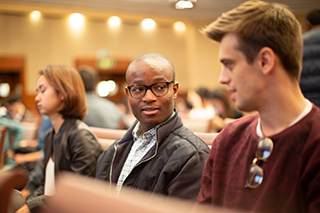
"I would definitely recommend UCL to anyone who is planning on doing a PhD in law"
"UCL has provided me with opportunities to present my work, both domestically and internationally, as well as to undertake a research visit to another university. It has provided me with the skills and experiences necessary to succeed in my future career, both in and out of academia."
Joe Atkinson, UCL Laws PhD student
Read about our alumni and where they are now
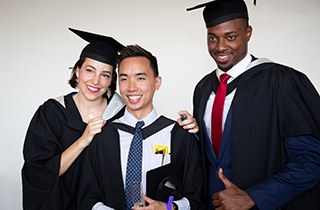
If you have any questions about the MPhil/PhD programme or the admissions procedure at UCL Laws please contact us at:
Email: [email protected] You should always quote your UCL Application ID number in any correspondence relating to your application.
Unfortunately, the UCL Laws Research Office does not accept drop-in visitors.
UCL Laws student news
Funnelback feed: UCL Faculty of Laws news UCL Faculty of Laws events UCL Faculty of Laws Research News UCL Faculty of Laws Bentham House News UCL Faculty of Laws Pro Bono News UCL Faculty of Laws Alumni News UCL Faculty of Laws Life at Laws News UCL Faculty of Laws Media News UCL Faculty of Laws Staff News UCL Faculty of Laws Publications UCL Faculty of Laws events Legal Problems UCL Faculty of Laws news [students] UCL Faculty of Laws Life at Laws News [Student News]: https://cms-feed.ucl.ac.uk/s/search.json?collection=drupal-laws-news&met... Double click the feed URL above to edit

COMMENTS
The structure of the Law PhD is 3 years full-time (or part-time equivalent) + 12 months of a 'Writing Up' year. This means most full-time students submit their thesis toward the end of their 4th year. Over the course of the PhD, your will undertake independent research under the guidance of your supervisors to produce an innovative thesis of up ...
With PhD completion rates at King's among the highest in the country, and 94 per cent of master's graduates in full time work within six months of graduation (DHLE, 2014) you can be sure to receive the best support to achieve success. King's is ranked fourth in the UK for graduate employability, according to the results of Times Higher ...
The Dickson Poon School of Law is home to over 90 doctoral researchers. Their projects cover a broad range of topics from intellectual property to information technology, from competition law to counter-rules, from global justice to gender equality. We offer two research degrees - the Masters of Philosophy in Law (MPhil) and the Doctor of ...
Organisation profile. The Dickson Poon School of Law, King's College London is one of the oldest law schools in England and recognised globally as one of the best law schools in the world.*. The School was established in 1831 and has played an integral role in the life of King's since the university was formed almost 200 years ago.
The School's vision at the King's College London for its research culture is to create a focal point for interdisciplinary, transnational legal research that encourages cross-fertilisation of ideas within existing areas of strength while incorporating a new global perspective. The School is one of a handful of Law Research Schools around the ...
kcl.ac.uk/law. The Dickson Poon School of Law is the law school of King's College London, itself part of the federal University of London, and serves as one of the nine schools of study within the college. It is situated on the Strand in the East Wing of Somerset House, in close proximity to the Royal Courts of Justice and the four Inns of ...
The Law came into effect on 1 March 2020 and has been considered as the biggest overhaul of China's securities regulatory regime since the Law was first enacted in 1998. It has 226 articles ...
Search Funded PhD Projects, Programmes & Scholarships in Law, kcl. Search for PhD funding, scholarships & studentships in the UK, Europe and around the world. PhDs ; PhD Opportunities PhDs by discipline PhDs by subject PhDs by country PhD research projects PhD research programmes View all PhD opportunities.
MPhil/PhD Programmes. There are over 400 research students at the Institute who come from a range of backgrounds including psychology, psychiatry, nursing, social work and basic sciences. Our MPhil/PhD programme allows students to carry out research in any of our 14 departments and in a wide variety of areas; from molecular genetics and biology ...
Emily Barritt. Laws - Senior Lecturer in Environmental Law. Martin Bengtzen. Laws - Lecturer in Corporate and Commercial Law (Online Programmes) Jo Bingham. Laws - Senior Lecturer in Professional Legal Practice Education. Andrea Biondi. Laws - Professor of European Union Law. Robert Blackburn, KC.
Partially self funding a law PhD at KCL? I was accepted into KCL's MPhil/PhD program in law, but did not get internal funding. I didn't apply to any outside funding and most seem to have passed its deadlines. I have gone through many threads in this sub and almost everyone seems to be advocating that you should never self-fund your PhD.
Dr. Soterios Loizou, Senior Lecturer at The Dickson Poon School of Law since 2006, holds prestigious fellowships and degrees, including a PhD from the University of Cambridge and Harvard Law School. His research in commercial law and international arbitration has won him top honors such as the Colin B. Picker Prize.
Hi, I'm a PhD researcher at the University of Sussex, and I am conducting a study aimed at understanding the experiences of international university students in the UK. This 10-minute survey explores various aspects of the international student experience, including challenges encountered, formation of social groups, perceived social support ...
UCL Laws has one of the most selective MPhil/PhD programmes in the UK, and produces graduates of internationally recognised quality. Ranked the top UK Law institution for research quality in the most recent Research Excellence Framework (2021), UCL Laws attracts leading figures in the field to our extensive programme of events, informing debate on critical legal issues.
Award of Degree. Upon successful completion of the programme, a student will be conferred a PhD degree jointly awarded by the University of Hong Kong and the King's College London. Background of King's College London King's College London was founded in 1829 and is one of the top 10 universities in the United Kingdom according to latest ...
Application Deadline. PhD programme (for admissions in 2024-2025) Hong Kong PhD Fellowships: 1 December 2023 at 12:00 noon (Hong Kong Time) Main round application: 1 September - 1 December, 2023 1st Clearing Round: 2 December, 2023 - 30 April, 2024 2nd Clearing Round: 1 May - 31 August, 2024.
A community of scholars. UCL Laws is a world-leading community of intellectually dynamic scholars responding to today's challenges. As a Laws MPhil/PhD student, you will have the opportunity to learn from, and contribute to, this research culture. The UCL Laws Faculty is rated the top law school for research quality in the UK ( REF 2021 ).